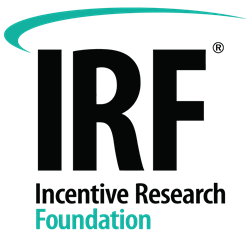
The IRF 2020 Wellness in Meetings and Incentive Travel Study addresses the top reasons wellness is not being incorporated into incentives and provides recommendations on how to overcome these common objections.
WASHINGTON (PRWEB)
February 27, 2020
A recent survey of meeting planners conducted by the IRF reveals a clear ongoing gap between the corporate focus on wellness and the incorporation of wellness practices into meetings and incentives. The IRF 2020 Wellness in Meetings and Incentive Travel Study explores this “wellness gap” and offers insights from meeting planners who have successfully integrated wellness into their meetings and incentive travel programs.
“While companies have a very strong focus on wellness programs for employees, it is not translating into their meetings, events, and incentives in a consistent way,” said Stephanie Harris, IRF President. “The IRF 2020 Wellness in Meetings and Incentive Travel Study addresses the top reasons wellness is not being incorporated into incentives and provides recommendations on how to overcome these common objections.”
The IRF conducted the study in November and December 2019 and received 224 responses from experienced meeting planners. Respondents included external meeting planners, such as agencies and third-parties (52%) and internal meeting planners (48%). Almost half (48%) of the respondents planned incentive meetings or incentive trips.
While the majority of incentive meeting planners do not offer or plan wellness-focused incentive trips, they do offer wellness-centric activities at their incentive trips and meetings. The IRF 2020 Wellness in Meetings and Incentive Travel Study also reports that 41% of event planners who plan incentive meetings or incentive trips indicated the amount of time spent on wellness activities increased over the past year.
The IRF 2020 Wellness in Meetings and Incentive Travel Study provides a detailed look at practices meeting planners are using to design and implement effective health and wellness programs. Key findings include:
-
While 86% of internal meeting planners indicated wellness was a critical focus for their company, only 27% indicated the company would accept additional costs to incorporate wellness into meetings - If extra budget is made available for wellness and healthy options, there is only a 10% improvement in how healthy a meeting or event is for participants
- The top inclusions in incentive travel programs are locally-sourced food, use of the spa, and yoga classes
- The top objections to offering wellness inclusions were cost, not a cultural fit, and lack of interest by attendees
- Low-cost wellness inclusions include healthy snacks, stretch breaks, and crowd-sourced yoga or running activities
To view or download a copy of the study, please visit:https://theirf.org/research/the-irf-2020-wellness-in-meetings-incentive-travel-study/2729/
To view of download the companion report, The Stressed-Out Meeting Planner: Personal Wellness Onsite, please visit: https://theirf.org/research/the-stressed-out-meeting-planner-personal-wellness-onsite/2731/
The IRF 2020 Wellness in Meetings and Incentive Travel Study was supported by IRF Research Advocacy Partner, Prevue Meetings & Incentives.
About the IRF:
The Incentive Research Foundation (TheIRF.org) funds and promotes research to advance the science and enhance the awareness and appropriate application of motivation and incentives in business and industry globally. The goal is to increase the understanding, effective use, and resultant benefits of incentives to businesses that currently use incentives, as well as businesses interested in improved performance.
Share article on social media or email:

